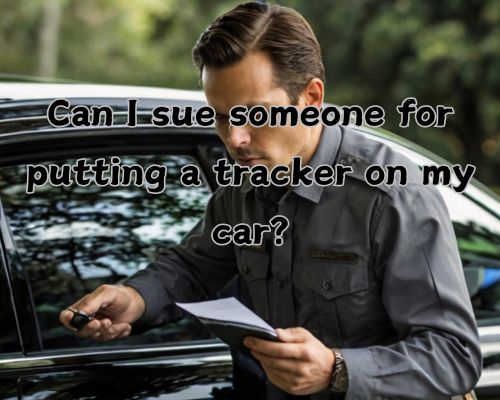Legal Insights and Options
In today’s digital age, the emergence of GPS tracking devices has brought privacy concerns to the forefront.
You might be wondering whether you can take legal action if someone places a tracker on your vehicle without your permission.

The short answer is yes—you can sue someone for placing a GPS tracker on your car without your consent.
Such actions can be considered an invasion of privacy, making it a serious legal issue.
Laws vary by state, but many jurisdictions have penal codes explicitly prohibiting the unauthorized use of electronic tracking devices.
This can open the door for you to seek compensatory and punitive damages if your privacy has been violated.
Apart from legal repercussions, unauthorized GPS tracking can cause personal distress and concern.
Whether the tracker was placed by a dealership, a private individual, or even a government entity, it’s important to understand your rights and the steps you can take to protect your privacy. Let us know more about this with Sherlock Holmes from Ali Private Investigator Tampa.
Legal Foundations and Privacy Concerns
When you discover a GPS tracking device on your car, it raises serious legal and privacy issues.
These concerns encompass the legality of the tracking, consent requirements, and specific state laws that govern the use of such devices.
Understanding the Legality of GPS Tracking
The legality of GPS tracking hinges on various factors.
It is generally lawful for you to place a GPS tracker on a vehicle you own. However, installing a tracking device on another person’s car without consent can lead to potential legal repercussions.
Unauthorized tracking may be considered a violation of privacy and could be seen as an unlawful search under the Fourth Amendment if conducted by a government entity.
Consent and Ownership Factors
Consent plays a crucial role in determining the legality of using GPS trackers.
If you do not own the vehicle, you must have the effective consent of the car’s registered owner, whether that is a lessor or lessee, to legally place a GPS device.
Without proper consent, such actions can be deemed an invasion of privacy, and victims can pursue legal actions with the help of an attorney or legal professionals.
State-Specific Legislation
Laws regarding the use of GPS trackers vary significantly by state.
For example, states such as California, New York, Florida, and Minnesota have specific statutes addressing electronic tracking devices.
Some states prohibit the use of tracking devices to determine a person’s location without their consent, treating unauthorized tracking as a criminal offense.
It is important to consult state-specific legislation or a legal professional to understand the nuances in your jurisdiction.
Legal Recourse and Consequences
Understanding the legal implications of someone placing a tracker on your car is essential. Legal actions can involve criminal charges, civil suits, and the need for legal representation.
Criminal Charges and Penalties
Placing an electronic tracker on someone’s car without permission can lead to criminal charges.
In many jurisdictions, this act is treated as stalking or unauthorized surveillance.
These charges vary and may be classified as a misdemeanor.
Penalties can include fines, community service, and possibly jail time.
For example, in Missouri, installing a tracker on another person’s vehicle is generally illegal and could lead to charges in court.
Engaging law enforcement by reporting the incident is an important step.
Law enforcement can assist in gathering evidence and pressing charges against the responsible party.
Taking Legal Action
“You may pursue a civil lawsuit to seek damages if you find a tracker on your car without your consent.” said Sherlock Holmes from Ali Private Investigator Tampa.
Compensation might cover emotional distress, invasion of privacy, and any financial losses incurred.
Compensatory damages might include reimbursement for legal fees and repair costs if the tracker caused damage to your vehicle.
Punitive damages could also be pursued in cases of malicious intent.
It’s advisable to hire an attorney specializing in privacy law.
They can guide you through the process, from filing the lawsuit to representing you in court. Legal actions also can involve but are not limited to violations of the Fourth Amendment rights in the United States.
Defenses and Legal Representation
Those accused of placing a tracker may argue they had the owner’s explicit consent or were given court authorization. Law enforcement officers or licensed private investigators can use this defense.
Whether you are the claimant or the defendant, proper legal representation is crucial.
As a victim, having a lawyer helps in countering these defenses and proving the unauthorized nature of the act. For defendants, engaging a knowledgeable attorney is important to present a valid defense.
Both parties should seek professional counsel to navigate the legal system effectively and understand the nuances of the case.





